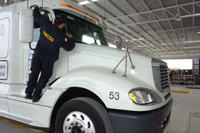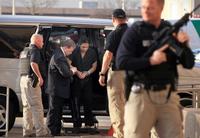-
Trusted Traveler program may come back
A report, commissioned by the U.S. Travel Association and released Wednesday, calls on airlines to allow passengers to check one bag free of charge and urges the creation of a voluntary “trusted traveler” program that partially resembles a mandatory one previously proposed by President George W. Bush — and canceled by Congress; Napolitano touts the “airport checkpoint of tomorrow”
-
-
The health effects of airport security scanners
The Transportation Security Administration (TSA) has begun to use whole-body imaging scanners as a primary screening measure on travelers passing through airport security checkpoints; one type of scanner employs millimeter wave technology, which delivers no ionizing radiation; the second type of scanner currently deployed at airports, however, uses backscatter X-rays that expose the individual being screened to very low levels of ionizing radiation; what are the health implications of these scanners? Two prominent radiologists offer answers
-
-
Monitoring Mexican trucks operating in the U.S.

The U.S. plan to equip Mexican trucks with electronic recorders for driver logs would be a limited, temporary program undertaken because it is the only way the Federal Motor Carrier Safety Administration (FCMSA) can ensure that the Mexican trucks will be monitored, the U.S. government says; under (NAFTA), the United States cannot require Mexican carriers to do anything that U.S. carriers are not required to do, but the government still must provide a way to monitor Mexican carriers for compliance with both the hours of service rules and the cabotage rules that restrict freight hauling between points in the United States
-
-
Air cargo screening lagging
The Government Accountability Office says the U.S. Transportation Security Administration (TSA) is still contending with issues reported last June that could affect the agency’s ability to meet an end-of-year deadline for screening all international cargo on passenger aircraft
-
-
Alaska Airlines sorry for detaining passengers over tefillin
Alaska Airlines flight attendants, concerned by the prayers of three Orthodox Jews being said aloud in Hebrew and the unfamiliar tefillin — the boxes with leather straps hanging from them, which orthodox Jews wear when praying — locked down the cockpit and radioed a security alert ahead to Los Angeles International Airport
-
-
NYPD's combat vessel will thwart Mumbai-like attacks
To prevent a Mumbai-like attack in New York, the NYPD will be getting a high-speed combat vessel; the 71-foot craft, which can hit speeds of 40 knots and will be able to carry up to thirty police officers fully armed with heavy weapons; the high-speed boat will be outfitted with radiation detection equipment and infrared cameras, as well as a satellite communication facilities
-
-
Dignity preserving undies under development
New undergarments aim to protect air travelers’ privacy and dignity; the underwear is covered with a special paint made from a mixture of barium sulphate, aluminum, ground glass, and other materials that work to reflect and scatter X-rays; the undergarments block out passengers’ privates, while still allowing operators to see dangerous objects such as guns, knives, and explosives
-
-
OSI Systems to develop advanced cargo screening system
Rapiscan Systems, the security division of OSI Systems, Inc., was recently awarded a $29 million contract with DHS’ Science and Technology Directorate to develop sophisticated new cargo screening systems; the program is designed to produce the next generation of non-intrusive cargo screening systems that will be capable of automatically detecting and identifying multiple threats and contraband including explosives, narcotics, and chemical weapons in cargo containers entering the United States by air, land, and sea.
-
-
Another ATF program in Mexico comes under fire
The U.S. Bureau of Alcohol, Tobacco, Firearms and Explosives (ATF) has launched several program aimed at slowing down the flow of American weapons into Mexico; some of these programs are more successful than others; the latest program to come under fire is Operation Fast and Furious; Mexican lawmakers charge that under the program, American weapons were allowed into Mexico, where the ATF lost track of them; some of these lost weapons are responsible for 150 killings
-
-
New radar improves pirate threat detection
New maritime radar helps protects ships again pirates; the radar is effective in detecting small targets, especially in high levels of rain and sea clutter, and it automatically alerts watch keepers about craft displaying hostile behavior patterns
-
-
New technology allows detection of nuclear materials from a mile away
New detection technology would allow illicit nuclear material to be detected from up to a mile away; the technology, developed by the Idaho National Laboratory, will help protect the United States against the smuggling of nuclear materials into the country; field tests will begin this summer
-
-
Lawmakers want cars equipped with alcohol detection devices
A bill sponsored by nine U.S. senators would provide $60 million over five years to speed up research into devices to detect alcohol on a driver’s breath, through touch on the steering wheel or through other methods; car owners could select the option when buying a new vehicle; the device would prevent the car from starting if the driver is impaired
-
-
On bangs and whimpers
Yesterday was the first day of the congressional hearings on Islamic radicalization in America; it is already clear that the hearings will not become important and memorable like the Army-McCarthy Hearings of the early 1950s, the Fulbright hearings of the late 1960s, or the Church Hearings of the mid-1970s; in today’s political climate, nothing can bring a conversation to an end more quickly than accusing a public figure of engaging in stereotyping ethnic or religious minorities, of ethnic profiling and scapegoating — whether or not such accusations have any merit; the Democrats on the committee went on the offensive, painting the hearings as illegitimate and making the hearings themselves the focus of attention and debate; the tone and body language of many of the Republicans on the committee showed that they grasped that this was a no-winner for them; yes, they denied charges by Democrats that this was a case of witch hunting and stereotyping, but they acted as if they were simply hoping to ride out the hearings without doing anything too disastrous
-
-
Arrest of Saudi student prompts questions on visa security

The FBI’s arrest of Saudi national Khalid Ali-M Aldawsari for allegedly trying to purchase bomb-making chemicals, plotting to smuggle a bomb into a nightclub, and planning to plant explosives in toy dolls; the case of Aldawsari, a student of chemical engineering at Texas Tech on a student visa, has ignited a debate among House lawmakers over whether further steps need to be taken to screen or monitor people in the United States on visas
-
-
Securing America's ports
Each year roughly $3 trillion worth of goods enters into the United States via water and more than 90 percent of the world’s cargo travels by sea making ports a prime target for terrorist organizations; it was not until the after 9/11 that port security became a top priority; the Port of Long Beach handles 40 to 45 percent of all the goods that enter the United States; to secure the 3,200 acre Port of Long Beach, the port has added a sophisticated series of security measures in recent years; a senior official from the Port of Long Beach will be speaking at a panel at the upcoming ISC West Conference to discuss port security strategy and interagency coordination
-
More headlines
The long view
New Technology is Keeping the Skies Safe
DHS S&T Baggage, Cargo, and People Screening (BCP) Program develops state-of-the-art screening solutions to help secure airspace, communities, and borders
